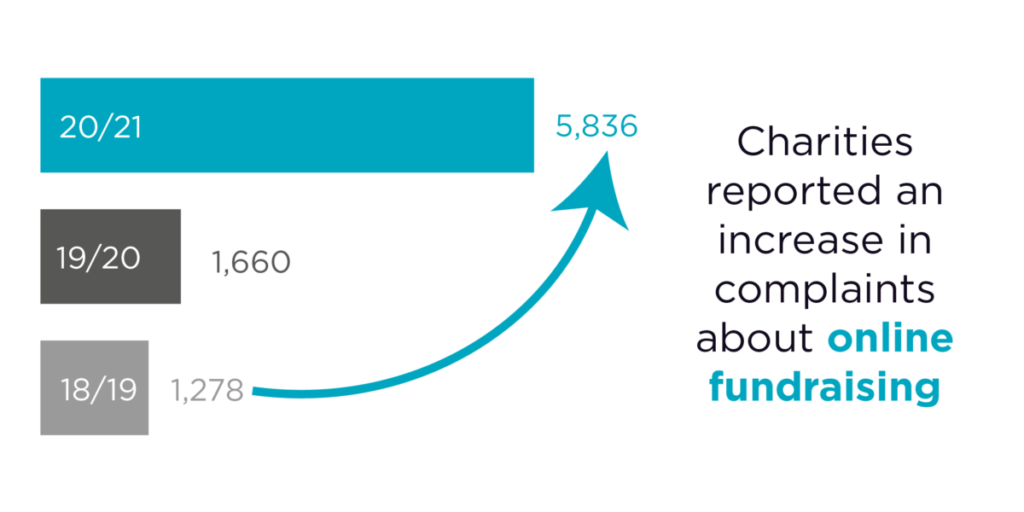Online fundraising complaints up by 252% during the pandemic

In the year that much fundraising shifted online due to restrictions in the face of the pandemic, complaints about online fundraising increased by 252%, according to the Fundraising Regulator. Overall complaints though were down on the previous year, and still dominated by complaints about charity bags.
Online fundraising was the most complained about method of fundraising during the height of the pandemic, according to the Fundraising Regulator’s Annual Complaints Report. This is the first time in four years that online fundraising has been the most complained about method reported by the sample charities.
From 1 April 2020 to 31 March 2021, 56 of the UK’s largest fundraising charities reported 5,836 complaints about online fundraising to the Fundraising Regulator. This is a 252% increase on the figure reported in the previous year.
Advertisement
Online fundraising methods include:
- social media
- charity websites
- advertising banners.
When restrictions on person-to-person contact were put in place, many charities increased their use of online fundraising, while public fundraising methods, such as events fundraising, street fundraising and door-to-door fundraising were paused.

Context of complaints
The Fundraising Regulator operates in England, Wales and Northern Ireland and has a lead role where charities based in those three countries fundraise in Scotland.
It acknowledged that, despite the increase in complaints, the number reported by charities about online fundraising was still “relatively small” when compared with the volume of activity carried out.
The report finds that one in 1,886,192 impressions, or views of an online fundraising message, generated a complaint.
During the period of the report the Fundraising Regulator received 84 complaints from members of the public about digital fundraising methods. This is an increase from the 56 complaints received the previous year.
This was the period in which public fundraising methods, such as events fundraising, street fundraising and door-to-door fundraising were paused, and the volume and variety of online fundraising activities were boosted by many charities.
In terms of the volume of charities, not all of whom actively fundraise of course, the NCVO reports today that in 2018/19 there were “163,000 voluntary organisations in the UK”. The 56 charities that this report focuses are on amongst the largest fundraising charities, meaning that together they conduct the majority of fundraising activities in the UK. They each spend more than £5 million per year on their fundraising activities.
Reduction in total number of complaints
The total number of complaints received by the sample charities was down during the pandemic. In 2021, 17,800 complaints were received, which is down by 4% on last year’s figure.
![The total number of complaints reported by fundraising charities has declined over the past three years. [Bar chart]. Source: Fundraising Regulator](https://fundraising.co.uk/wp-content/uploads/2021/10/fundraising-regulator-2021-report-complaints-declined-1024x512.png)
This decline is mirrored in the complaints about charitable fundraising reported by the Fundraising Regulator; it closed 362 complaints during 2020/21, which is down slightly on the 368 the previous year.
Reviewing digital fundraising standards
In light of this year’s report the Fundraising Regulator will “focus on supporting the sector to achieve good standards of fundraising in this area, and to understand the risks that this method can involve”.
This will include a review of the Code of Fundraising Practice in 2022, which will examine whether existing standards in the code related to digital fundraising “are sufficient to support the sector”, or whether changes are needed in this area.
The Fundraising Regulator’s Chief Executive Gerald Oppenheim said that the report’s findings, particularly on digital fundraising, will enable the organisation to help support charities to “make sure both charities and the public are equipped with the tools to fundraise, and donate, safely.”
Other areas of complaints about fundraising
After online fundraising the methods of fundraising that attracted the most complaints to the 56 charities were:
- addressed mail (3,687)
- corporate fundraising (2,504)
Two types of complaint
The Annual Complains report is divided into two parts.
- Part 1 of the report examines complaints that have been escalated to the Fundraising Regulator. The Fundraising Regulator investigates complaints about charitable fundraising where these have not been resolved by the organisations concerned themselves.
- Part 2 examines the complaints received by 56 of the UK’s largest fundraising charities. They report the number of complaints and, where possible, the reason for complaints, for a range of fundraising methods.
Complaints to the Fundraising Regulator
Complaints made directly to the Fundraising Regulator, rather than to charities, were led for the third year in a row by those about charity bags, with 105 complaints made in 2020/21.
The second most complained about method was online/digital and the third was addressed mail.
What can charities learn about the complaints?
The most common cause of complaint across all fundraising methods received by the Fundraising Regulator was misleading information. This included:
- unclear claims about why donations are needed or how they will be spent
- a failure to present information that allows the donor to make an informed decision.
Gerald Oppenheim said that he was encouraged by the continued decline in the overall number of complaints about charitable fundraising. He said that this “shows that good fundraising practice has prevailed at a time of unprecedented challenges for the sector”.
He added:
“The Annual Complaints Report provides us with a really important overview of how the fundraising landscape has changed over the past year. This report is an early indicator of the impact of the pandemic on the charity sector and it is a vital tool to help us understand where the sector needs to improve its fundraising practices.”
The Fundraising Regulator was established following the 2015 cross-party Parliamentary Review of Fundraising chaired by Sir Stuart Etherington. The regulator is independent and was launched on 7 July 2016.
- Fundraising Regulator updates Code on TPS compliance (21 June 2018)
- Complaints to Fundraising Regulator rise 13% (5 November 2020)
- Code of Fundraising Practice on house to house collections opens to public consultation (29 September 2010)



